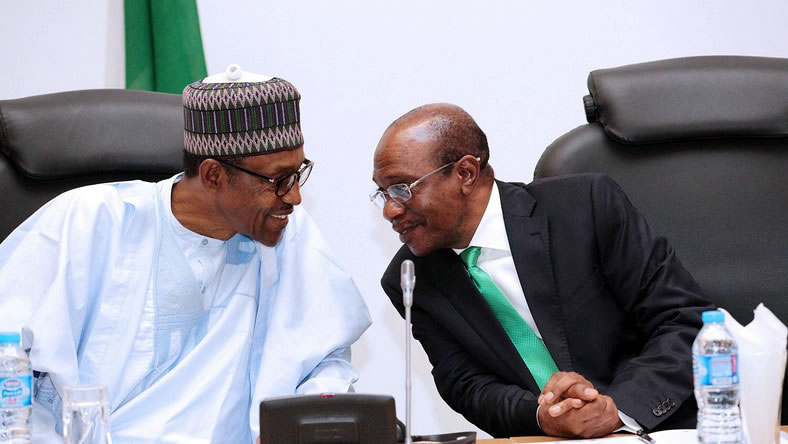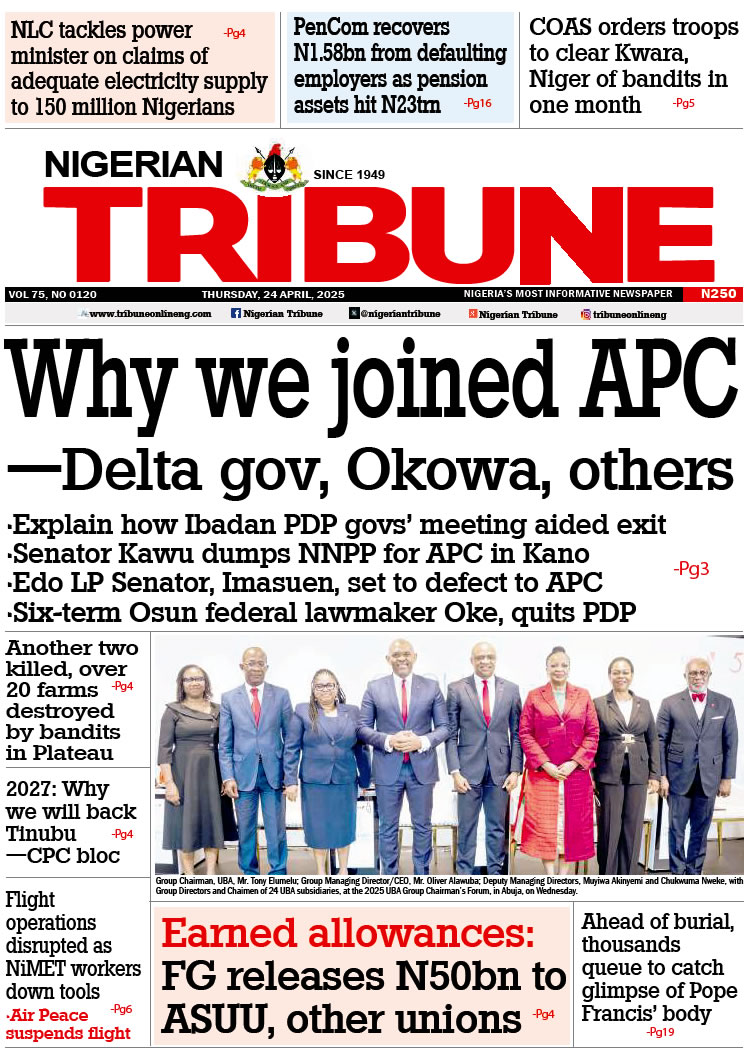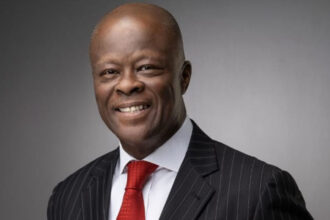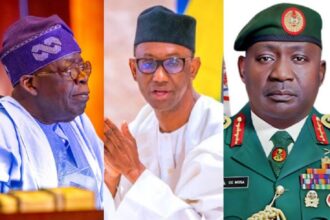IN July, a man was said to have advertised a parcel of land for N55 million but by the third week of September, he had raised the price to N62 million.
When challenged on the reason he increased the price in just two months when no serious person came for it at N55 million, he simply referred the enquirer to the exchange rate board and said: “See what exchange rate is saying today as opposed to what it was saying in July.” He was again asked why exchange rate was now determining the price of land in Nigeria, he declared.
“I wanted to sell the land and take the money to London to buy a property there. The more the naira falls, the more naira I need to buy the London property.”
The above is a simple illustration of how the never ending depreciation and devaluation of the local currency has become a matter of concern to every Nigerian living either in urban or rural areas.
Even the tomato farmer has to buy bread, in which the main ingredient, wheat is imported from the United States of America.
A man whose income was N150,000 in early 2015 was earning the equivalent of $1,000. However, his income must have substantially increased to N570,000 for him to earn the same $1,000 as at today.
Since 2015, the Central Bank of Nigeria (CBN) has embarked on series of experiments to both boost local production for consumption and job creation, in addition to exporting to boosting foreign earnings.
On June 23, 2015, CBN issued a circular titled inclusion of some imported goods and services on the list of items not valid for foreign exchange in the Nigerian foreign exchange markets.
It said “in the continuing effort to sustain the stability of the foreign exchange market and ensure the efficient utilisation of foreign exchange and the derivation of optimum benefit from goods and services imported into the country, it has become imperative to exclude importers of some goods and services from accessing foreign exchange at the Nigerian foreign exchange markets in order to encourage local production of these items.
The 41 items have since increased to 43.
Two months ago after the July 2021 meeting of the Monetary Policy Committee (MPC), Governor of CBN, Mr Godwin Emefiele cancelled the long standing arrangement whereby the apex bank allocated $20,000 to each of the about 5,500 existing bureaux de change weekly as a result of allegations that they were contributing to the continuous depreciation of the naira while also turning themselves into wholesale suppliers.
Also, to encourage accretion of foreign reserves by encouraging diaspora Nigerians to remit money home through official sources, CBN introduced an incentive policy of giving N5 for every dollar received by Nigerians officially to Nigerians.
Despite these efforts, CBN devalued the currency from N379/$ to N410/$ on May 25.
At the alternative market however, the currency fell around the same time from N470/$ to N574/$ as at last Friday.
Frustrated that all efforts seem to be have counter effects, Emefiele at a press conference to announce the outcome of the 5th MPC meeting for the year on Friday burst out angrily: “The only exchange rate market is the Investors and Exporters window, which is the market that we expect everybody that wants to buy or sell dollars should use. I am sorry to say: I do not recognise any other market. We’ve asked ourselves at the CBN, why did we have to wait so long? CBN remained the only central bank in the world to dip its hands into our commonwealth mad pack dollars to BDCs all in an effort to stabilise the exchange rate. For me, it’s a wrong decision. It has stopped for good. The Bank of England or U.S. Federal Reserves do not sell dollars to BDCs even though they exist. It beats my imagination that tended to support illegality of people who are involved in graft and corruption,” he said.
According to him, commercial banks have been given instructions to meet every legitimate demand for foreign exchange including requests that are above the allowed limit, Godwin Emefiele, CBN Governor provided they are lawful.
He said that the apex bank was investigating about 25 accounts in eight banks belonging to Oniwinde and AbokiFX with transactions worth billions without any forex trading licence.
Mr Oniwinde started the AbokiFX operation in 2015 and has since milked the economy by manipulating the exchange rate. Oniwinde lives in London while concocting criminal activities on our economy.
“Our preliminary findings show that the company continues to file the same cash account in the United Kingdom whereas he maintained about 25 accounts with eight banks in Nigeria, milking the system and collecting cash through Automatic Teller machines in London. He then sells tens of millions in FX to company’s in Nigeria; we will go after them all.”
Many experts have suggested additional ways in which CBN could stop further slide of the naira and increase the level of foreign reserves.
Former Deputy Governor of CBN, Dr Kingsley Moghalu suggested that the free fall of the naira was just because the economy is neither productive nor competitive enough in international trade.
He argued that Nigeria does not have a “diversified base of complex value added products it exports and earns forex from those exports. So if we don’t diversify but continue to rely on crude oil as a mono -product economy, the Naira crisis will get worse, not better.”
According to Moghalu, other factors affecting naira value include “the basic factor of supply and demand (if too much Naira is chasing scarce dollars, the dollar gets stronger relative to the Naira, and vice versa).
Others are inflation (a high inflation economy such as Nigeria’s weakens the value of the legal tender), high government indebtedness (again, our case especially relative to our revenues and ability to pay which will be stretched the more we borrow on poor revenues, and 90 kobo out of every N1 goes to debt servicing).
Speculation also affects the naira value, as there are currency traders around the world for whom the weakness of a currency is their very good fortune. Such traders “attack” such currencies for profit, especially where the currency is using a fixed, official exchange rate determined by the central bank instead of the market.
As the Naira is effectively measured against a “reserve” currency (dollars, euros, pound sterling), speculators can attack such a currency for profit if the country (Nigeria in this case) is perceived to have insufficient foreign reserves to meet demand.
He then suggested that the CBN should either “let the Naira find its level in the market by stopping to subside it” or “consider dollarisation of the Nigerian economy.”
Also, a renowned economist, Dr Abiodun Adedipe of B. Adedipe Associates Limited, canvassed strict law and regulatory enforcement as recipe to increase foreign reserves.
According to him, whereas Nigerians abroad remit the equivalent of $34 billion home every year, “the dollar doesn’t leave where it is. The person that provides the naira equivalent here would rather keep the dollar equivalent outside there, so it doesn’t come into the FX market in Nigeria.
So, we don’t get the full benefit of diaspora remittances here in Nigeria, despite that we are top in terms of benefitting from migrant workers. What then happens is that instead of bringing it into the FX market in Nigeria, they keep it outside. That also becomes a leg that supports speculations that we talked about earlier on. How can we make it more attractive for those foreign currencies generated by migrant Nigerian workers to be remitted home, and become a part of our national supply to our market here? That now is a space for the BDCs,” he wondered.
He also explained that there is a regulation which forbids foreign entities that operate in Nigeria either as a business, NGO, or an international development partner or whatever it is, from borrowing naira from the Nigerian market here to trade.
“You are supposed to bring in foreign currencies into the FX market here in Nigeria. But where we have problems in Nigeria, which is our sad reality, is that we have laws for almost everything in Nigeria. Where the problem lies is enforcement.”
Adedipe also advised government to live by example. “The government needs to lead by saying each time we do our budget, the government must decide for instance to spend 30 per cent of the budget in buying things that are made in Nigeria, especially things that are high with local context.”
YOU SHOULD NOT MISS THESE HEADLINES FROM NIGERIAN TRIBUNE
Lagos Is Second Least Liveable City In The World For 2021
Lagos is the second least liveable city in the world for the year 2021. This is according to the most recent annual ranking put together by the Economist Intelligence Unit (EIU)…
CLAIM 1: A Twitter user claims UNICEF said any efforts to block children from accessing pornography might infringe their human rights.
VERDICT: MISLEADING!








